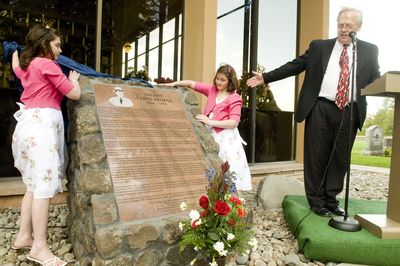Monument memorializes Prohibition-era sheriff

Floyd Brower was the sheriff of Spokane County from 1925 through 1930. During that time of Prohibition, his dry squad dumped 26,773 gallons of booze in one year, talked a rumrunner and renegade logger out of shooting him and caught serial killers and burglars.
It was a side of life his daughter and grandchildren never knew. They knew him as a loving father and grandfather who liked to cook split-pea soup and cared for his little dog Tootsie.
He had such a storied career that the Fairmount Memorial Association, the Spokane Police Department History Book Committee and the Spokane Law Enforcement Museum decided to dedicate to him their 11th monument of historical markers.
“It means a lot,” said Dale Fruin, Brower’s grandson. “He was a great man in all of our lives. His honor and his integrity were a tremendous thing.”
Before Brower entered law enforcement, he worked as a plumber and as an inspector for the city of Spokane water department. He also served for three years in the Washington National Guard.
He started working in the Sheriff’s Office in 1919 and by 1924 he became the chief deputy. In 1925 he became the sheriff through an appointment by the county commissioners after the previous sheriff resigned. He won the next general election and served Spokane County until 1930. After he left office, he moved to the West Side and became a King County deputy until 1935. He later became manager of the Burns International Detective Agency for the Northwest District.
In 1929, Brower once chased a shooting suspect, “Black Jack” Rowden, to a cabin near the Canadian border. Brower and a deputy used tear gas and a machine gun to shoot and kill Rowden.
He solved the mystery of the “Spokane Hatchet Slayer” in 1928. A community man and father of five was convicted and sentenced to hang after luring a young woman from Boston by promising to marry her. The man robbed and killed her the day she arrived in town.
It was for these acts Brower was honored during a ceremony last week in Fairmount Memorial Park. The Spokane Sheriff’s Department SCOPE mounted patrol unit brought Pinky, a riderless horse to symbolize a fallen hero and to represent Brower’s career during the transition from horses to automobiles.
Sheriff Ozzie Knezovich spoke at the ceremony, as well as Fruin.
Knezovich talked about Brower’s career and mentioned specifically the time when a bootlegger pointed a gun at Brower after the sheriff interrupted his booze-making operation. Brower talked the bootlegger out of shooting him and took him to jail.
“That shows extreme courage,” Knezovich said.
Brower’s family came to honor him at the ceremony – four generations of them. Among them were Brower’s only child, Mary Elizabeth Fruin, and her children, Dale Fruin and his wife, Lynn, of Spokane; Michael Fruin, of Seattle; and Craig Fruin, of California. The brothers also brought their children and grandchildren and held a mini-reunion at a reception after the ceremony.
Much of the information about Brower was collected by local historian Tony Bamonte, who helped Dale Fruin’s daughter Katie, 10, find information about one of her relatives for a class project at Wilson Elementary School.
Unfortunately, much of the information about Brower’s job was too violent for Katie to read in class. At the ceremony, Katie and her twin sister, Emily, unveiled the new monument dedicated to their great-grandfather.